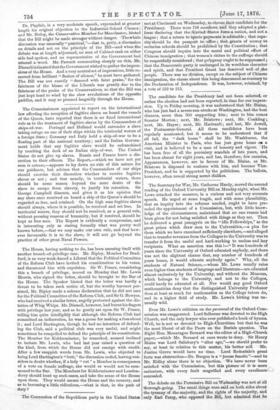The Commissioners appointed to report on the international law affecting
the reception of fugitive slaves on board the vessels of the Queen, have reported that there is no fixed international rule as to the treatment of fugitive slaves by the Commanders of ships-of-war. Portugal and Holland would surrender a slave taking refuge on one of their ships within the territorial waters of a foreign State ; Germany and Italy hold a ship-of-war to be a floating part of the national territory ; and the Italian Govern- ment holds that any fugitive slave would be enfranchised by touching the deck of an Italian ship-of-war. The United States do not give up slaves. Russia and France leave a dis- cretion to their officers. The Report,—which we have not yet seen in extenso,—appears to lay down no rule of this nature for our guidance, but advises that the Commanders of our ships should exercise their discretion whether to receive fugitive slaves or not ; and that usually, in territorial waters, there should be some reason beyond the mere desire of the slave to escape from slavery, to justify his retention. Sir George Campbell dissents, and gives it as his opinion that any slave once received on board a ship of the Queen's should be regarded as free, and retained. On the high seas fugitive slaves should always, where it is possible, be received and set free. In territorial waters, they should not be received, as a general rule, without pressing reasons of humanity, but if received, should be kept as free men. The Report is evidently a compromise, and is interesting only as stating formally what was pretty well known before,—that we may make our own rule, and that how- ever favourable it is to the slave, it will not go beyond the practice of other great Naval Powers.


































 Previous page
Previous page